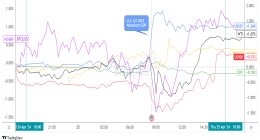
Wikipedia shows, however, that extreme circumstances, especially when related to public health, require different, more stringent rules, not better application of existing rules. The stakes are simply too high.
I spoke this week with the Wikipedia editor who guided the article about the new coronavirus from a one-sentence item in early January to a substantial article with charts of infections around the world. She goes by the handle Whispyhistory, and is a doctor in South London; she spoke via Skype from her office, which she proudly noted had a new thermometer that looks like a laser gun.
Whispyhistory has only been contributing for three years; she was recruited through an edit-a-thon at a medical library. While at first she was open with her colleagues about her side project, now she prefers to remain anonymous. “You start getting hounded by people about what you are writing,” she said. “It’s just so much easier to not use your real name.”
WikiProject Medicine welcomed her, she said, but she’s had to build a reputation for accuracy and responsibility. “You have to know what you are saying,” she said, and even so it can be intimidating. “You’ve got so many people watching you.” The picture she paints of the project’s contributors is akin to the staff of a demanding teaching hospital. The editors confer on a talk page she calls “the doctors’ mess” where they perform “triage” to assess which articles require attention immediately. Science and data reign; and above all else, the pledge is to do no harm.
On January 6, she said, a colleague asked her if she had heard of an outbreak of atypical pneumonia in China. She hadn’t, but “being someone who writes for Wikipedia, the first thing you do is see if it’s on Wikipedia. Someone had written the article the day before.” The article was thin, but Whispyhistory had the sense that “this might be something big,” so she added the WikiProject Medicine tag to the article and wrote a note informing her colleagues to pay attention to the outbreak, which they did.
Like a young resident, she pulled all-nighters before showing up at the office at 6 a.m., keeping a watch over the article as the virus spread. In those early days, for instance, she saw a note on the doctors’ mess that linked to a news report claiming that the new coronavirus could survive on surfaces for nine hours. The author wanted to add that information to the Wikipedia page immediately. “That already sends an alert since there is nothing that’s really so important that you’ve got to add something straight away,” she recalled. She went from the news article to the paper that it cited, and discovered that it was looking at the SARS virus, not the (very similar) one that causes Covid-19. She decided not to include the research.
As Heilman put it in an email, “Keeping Wikipedia reliable and up-to-date involves deleting material just as much as adding it.” I asked both him and Whispyhistory how the article on the new coronavirus managed to exclude the arguments that were being made (at least until recently) by President Trump and his supporters—that the disease is being hyped by Democrats and that it’s comparable to the flu. Don’t they have angry wannabe contributors accusing Wikipedia of bias? “That’s really easy to answer. … You have to cite everything you write,” Whispyhistory said. Heilman agreed that a requirement for legitimate sourcing filters out unfounded notions.
Bogus claims about the pandemic do show up on Wikipedia, but in a separate article: “Misinformation related to the 2019–20 coronavirus pandemic,” under the heading “Misinformation by governments/United States.” Heilman noted that Wikipedia has a structural advantage over the big social networks: “It takes more time and effort to disrupt Wikipedia than it does to restore Wikipedia to a reliable level. It’s the exact opposite on Twitter and Facebook, where it takes a second to spread false news,” while getting those lies removed will take a lot of time and effort.
Unless Twitter, Facebook and the others can learn to address misinformation more effectively, Wikipedia will remain the last best place on the Internet.
WIRED is providing unlimited free access to stories about the coronavirus pandemic. Sign up for our Coronavirus Update to get the latest in your inbox.
More From WIRED on Covid-19







